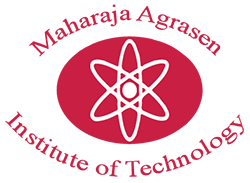MAHARAJA AGRASEN INSTITUTE OF TECHNOLOGY
DEPARTMENT OF INFORMATION TECHNOLOGY
Talk Session on National Innovation and Startup Policy: From Innovation to Startup
-----------------------------------------------------------------------------------------------------------------------------------
Speakers:
- Prof. Dr. M.L. Sharma, Head, Department of Information Technology, MAIT
- Dr. K.C. Tripathi, Asso. Professor, Department of Information Technology, MAIT
A talk session on “National Innovation and Startup Policy: From Innovation to StartUp” was organised by the Institution’s Innovation Council (IIC), MAIT on 30th January, 2021. The objective of the session was to create awareness among faculty members and students about the importance of innovation and StartUps. The session also highlighted the policies at the national and institutional levels.
The event started at 5 pm with brief inaugural ceremony. This was followed by inaugural welcome address by the Director- Prof. (Dr.) Neelam Sharma. In her welcome address the Director informed about the scope and usefulness of innovative approaches towards problem solving. She thanked the Dr. N.K. Garg, Founder and Chief Advisor, MATES, Delhi and Chancellor, MAU, HP for creating conducive atmosphere for innovation and StartUp in the institution.
The technical session commenced with the talk of Prof. M.L. Sharma. The talk of Prof. M.L. Sharma was motivational. He informed the audience about the innovations that have changed lives of millions through centuries. He also highlighted the key differences between invention and innovation. The key policies of the GoI- Make in India, StartUp India, Skill India and Digital India were brought to the notice of the audience. To motivate the audience he mentioned the innovations of young innovators who received the “Pradhan-Mantri Bal Puraskar-2021” in the “science and innovation” category.
The session progressed with the second speaker, Dr. K.C. Tripathi, wherein the participants were informed about the following:
- How an idea is transformed to innovation and finally to start-up. The involvement of stake holders at various steps was pointed out.
- Where India stands in Global Innovation Index was highlighted.
- Key points from the pre-budget speech-relating to the innovation and entrepreneurship- of the honourable President of India were highlighted.
- Some successful and failed start-ups were discussed.
The National Innovation and StartUp Policy-2019 (NISP) was also discussed. The policy was explained through the perspectives of institutes, faculty and students. Students and faculty members were apprised of the following key points in the NISP policy document:
Institute level:
- The NISP envisions that all stakeholders- the govt agencies, the Higher Education Institutes (HEIs), the faculty and the students come on a platform to contribute their bit for the holistic growth of the nation.
- Entrepreneurship promotion and development should be one of the major dimensions of the HEIs strategy.
- For institutes, the pre-incubation cell setup should be a priority and students and faculty be motivated to contribute to the same.
- Institutes should cooperate and encourage faculty and students to take up start-up initiatives and all possible support should be extended. In return, the institutes may take a proportionate equity in the start-up.
- Guest talks to be organized.
- Establishment of IICs in HEIs is aimed at formalising and streamlining the innovation to start-up process.
- Institutes should create awareness regarding steps taken by the MIC, like the SIM and ATAL ranking of institutions, for attracting the talent pool.
- To support technology incubators, academic institutes may approach private and corporate sectors to generate funds, under Corporate Social Responsibility (CSR) as per Section 135 of the Company Act 2013.
Faculty level:
- Faculty members should aspire to raise funds through various funding agencies.
- Role of faculty may vary from being an owner/ direct promoter, mentor, consultant or as on-board member of the start-up.
- Faculty must clearly separate and distinguish on-going research at the institute from the work conducted at the startup/ company.
Student level:
- Students are encouraged to take up initiatives and utilize the facilities provided by the institute.
- Students to demonstrate their skills through projects and discuss their ideas with faculty mentors who will guide them through the entire process of IIC working.
- Fair division of royalties among the inventors who incubate a start-up.
Both the speakers highlighted the importance of innovation and start-ups in realising the nation’s dream of $5 trillion economy by 2024.
The program ended with the ‘vote of thanks’ given by Prof. (Dr.) Namita Gupta, HoD, CSE. The event concluded at 6.40 pm. Mr Aman Kumar (ME), Ms Srishti Tiwari,(EEE), Mr Vineet Chanana and Ms Anushka Mahajan (EEE) were student coordinators of the event. Ms. Srishti Tiwari coordinated the program.
The session was conducted on Microsoft teams. About 175 participants attended the meet.
Delhi, 30th January, 2021.
Event Photographs:












